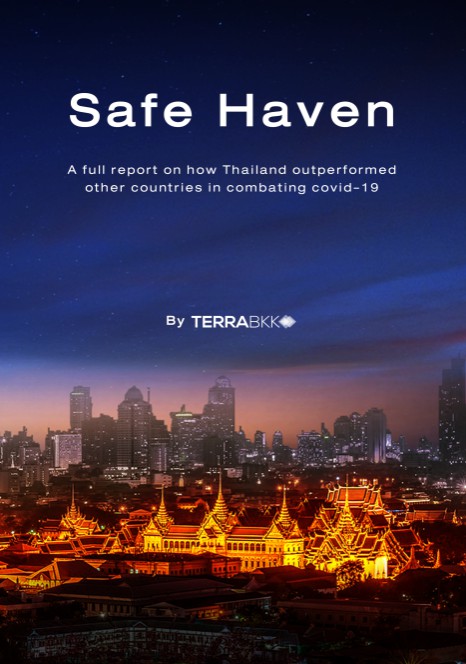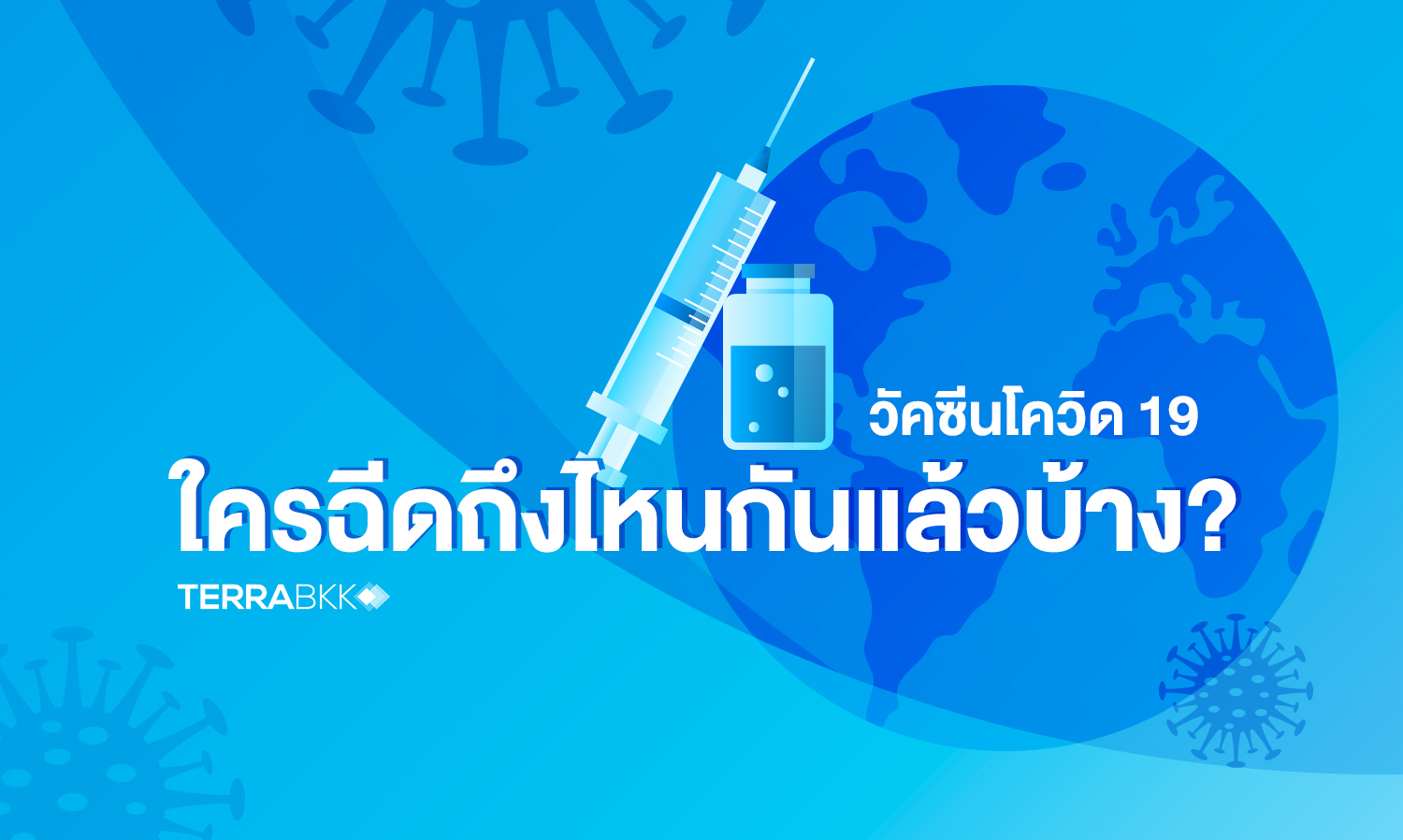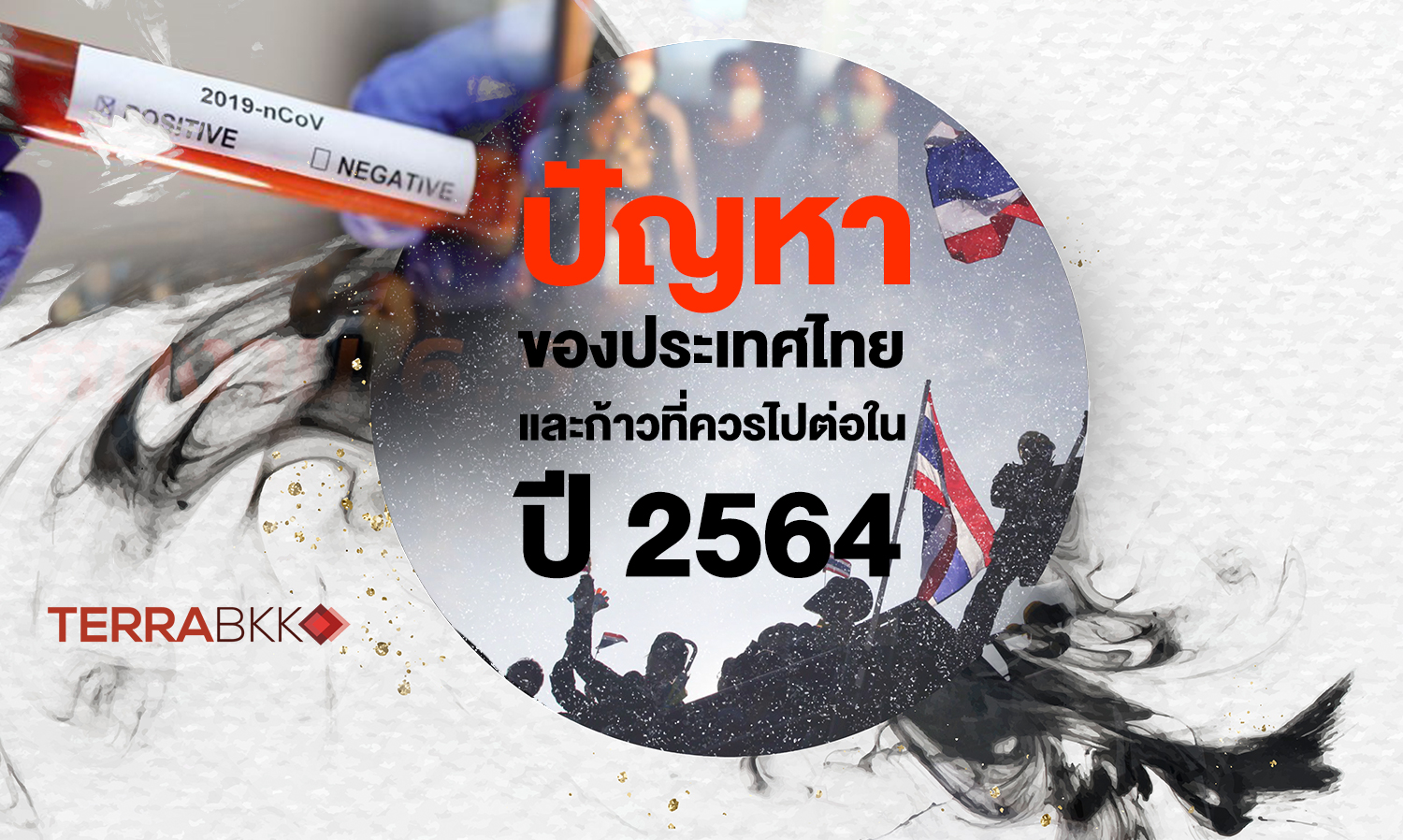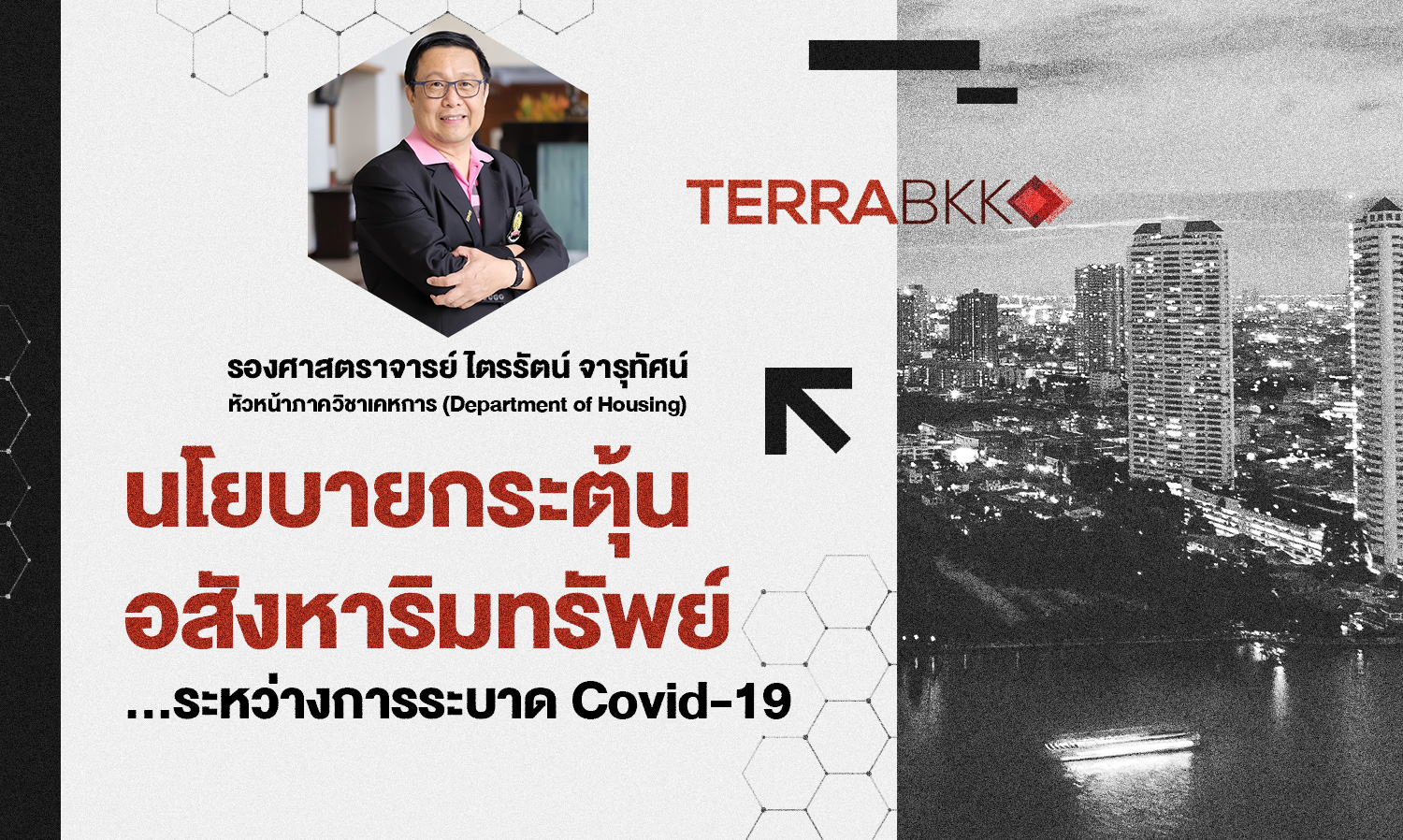[Full] Safe Haven : How Thailand outperformed other countries in combating COVID-19.
Note: This article is fact-based but with commercial purpose. If this does not suit you, please do not continue.
Paradise destination Read the short article here >>> Click
Thailand is one of the world’s most well-known vacation destinations. It is a symbol of relaxation, care, and pleasure and a place where anyone may enjoy high-quality services at affordable prices. Thai people are known to have an easy-going attitude and like to welcome foreigners. Very few visitors to the country report bad experiences or do not wish to return.
However, Thailand is a country that is generally not well known for its government’s management capabilities, and Thai citizens are not widely known for being disciplined. One may imagine that these two factors are the perfect ingredients for disaster during a time of crisis. Therefore, when COVID-19 first reached Thailand, many speculated that the pandemic in the country would spiral out of control “very fast.”
Here is what has happened…
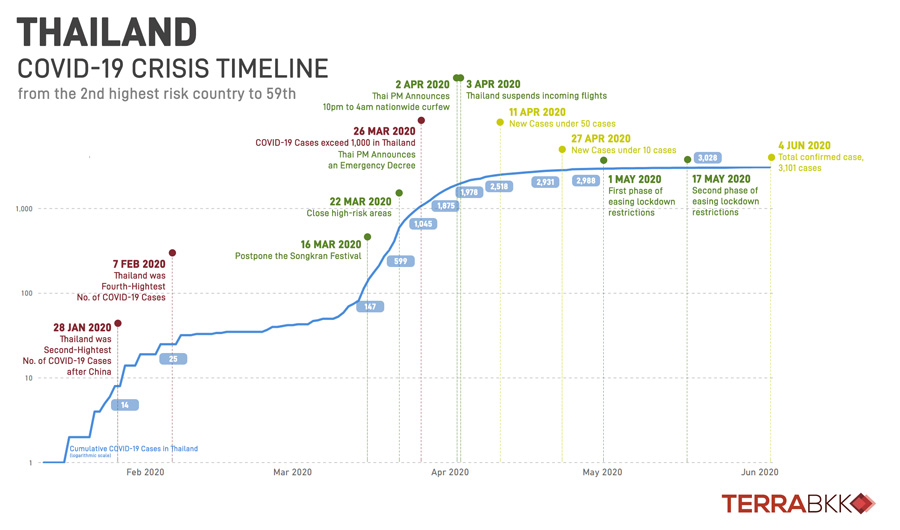
Please help us by participating in this questionnaire. >> Click
Thailand COVID-19 Crisis Timeline: From the 2nd highest risk country to the 59th
In January 2020, Thai citizens learned of the novel COVID-19 virus which was known as the "Wuhan Virus" at the time. The virus transmits quickly through human-to-human contact and can infect without either individual knowing.
On 28 January 2020, Thailand became the 2nd highest risk country for the virus. It had not yet been announced as a "pandemic" by the World Health Organization. Thailand and other countries in Asia became the center of attention for the crisis. Global media and health organizations closely monitored the virus crisis with little hope of containment.
However, after three months, Thailand was able to control the spread of the virus and the daily number of infected cases steadily declined. Thailand emerged as of the safest countries regarding the virus.
January 2020:
Thailand was considered a “Hot spot” for viral spread among the first batch of 30 nations that began encountering infected cases. This was likely because Thailand is the number one destination for Chinese tourists. In January 2020, Thailand had welcomed 1,030,148 Chinese tourists to the Kingdom. (Source: Ministry of Tourism and Sports of Thailand) The Thai government issued a report regarding the number of confirmed cases that placed Thailand at the 2nd highest rank of virus cases in the world behind China. In response to the crisis, the Thai Government swiftly established an executive crisis center with direct command from the Prime Minister to combat what was likely to be the greatest crisis of this generation. (Source: Department of disease control)
February 2020: Intensive Airport Screening Measures
Early February was the period when the public began to see actions from the Thai government in a major and direct way. Most of the confirmed cases in Thailand were from travellers who had returned from foreign countries.
7 February 2020:
Thailand dropped to 4th among countries having the highest number of confirmed cases. This drop is principally attributed to Thailand spearheading the policy of “arrival containment” based on the assumption that the virus had already spread outside of China. The validity of this assumption, at that time, was still being argued in many countries. Also, regarding the effect of the symptoms, whether it is like a normal “flue”.
12 February 2020:
The government intensified screening measures in eight provinces that are major tourist destinations: Bangkok, Chaing Rai, Chiang Mai, Samut Prakarn, Chonburi, Prajuab Kirikhan, Krabi, and Phuket (some of these destinations later became “extreme” hot spots for the virus).
29 February 2020:
The government issued a decree addressing COVID-19 as a “Hazardous Transmitted Disease,” adding the Covid-19 virus to the list of 13 infectious diseases in Thailand.
In the public, Thai people began to adjust their behavior according to the protective measure guidelines from the Ministry of Public Health. Facial masks and hand cleaning gel became items commonly carried by Thai citizens.
March 2020: Turning Point
1-15 March, 2020:
During this period, a large number of new cases were discovered which created panic among the Thai public.
The first fatal case was confirmed, and subsequently, the number of new cases grew from double-digits to hundreds. Combined with the discovery of a super spreader at the country’s Lumpini boxing event, many predicted that the number of cases would reach thousands within days.
On the 15th of March, Thailand surpassed 100 cases and became, once again, the focal point of the pandemic among the global community.
16-31 March, 2020
The government intensified its control measures to reduce the number of new cases. They announced the suspension of “Songkran Festival,” which is the celebration of Thai New Year and is famous around the world for festive gatherings and frivolously splashing water in public. The temporary closure of shopping malls, retail stores, restaurants, and businesses relating to public gatherings was announced.
On the 22nd of March, the Prime Minister declared a nationwide “State of Emergency” to mitigate the spread of Covid-19.
In addition, checkpoints were established along main roads to control interprovincial transportation. This was aimed at monitoring travellers’ health and preventing behavior that may increase the risk of infection spreading to neighboring regions in Thailand.
Please help us by participating in this questionnaire. >> Click

Credit: https://www.bangkokbiznews.com/news/detail/871773
Credit: https://news.thaipbs.or.th/content/290004
“#stay-home-stop-infection-for-the-country” was a campaign to promote new practices that help combat the COVID-19 pandemic. Thailand saw its private sectors and government enterprises (in Thailand, government enterprises are large organizations with substantial annual revenue that control national infrastructure projects and services) took part in this campaign with tangible action. Examples included offering a price cut for electrical and water services to help citizens temporarily unemployed due to the pandemic. Many large corporations provided a deep discount on necessity items. Technology companies provided novel solutions for both lifestyle and healthcare systems such as patient tracking systems. Hotel corporations converted some properties into quarantine centers. The support from these organizations was a much needed boost to the spirits of healthcare workers working at the frontlines of the crisis.
April 2020: Within two months, Thailand has reduced its global rank for the number of cases from the 2nd to 59th.
In April, the average daily number of newly reported cases was around 100+. This number may be considered favorably compared to the worst-case scenario predicted earlier during the outbreak. The government did not relax restrictions or consider this as a large accomplishment as these cases were from people who had visited healthcare facilities or individuals in quarantine centers after arriving from other countries.
3 April 2020: The Civil Aviation Authority of Thailand announced that all incoming international flights to Thailand would be suspended until the end of April.
9 April 2020: The government announced a nationwide prohibition of all alcohol sales in order to further reduce private gatherings.
11 April 2020: The number of daily new reported cases fell to less than 50.
27 April 2020: The number of daily new reported cases fell to single digits.
The government implemented new strategies for active testing and began to ease lockdown measures for certain types of businesses.
Please help us by participating in this questionnaire. >> Click

At the date that this article was published, the number of cumulative cases in Thailand was approximately 3,000 cases; however,
Social Distancing policies remain strictly enforced and practiced throughout the country. Facial masks are worn by virtually everyone in public. Free cleansing gel is available throughout all public spaces and establishments.

Credit: https://in.reuters.com/article/health-coronavirus
Credit: https://marketeeronline.co/archives/153255
The nationwide lockdown policy remains in effect but has been eased for some types of business. Many people in Thailand have begun to adjust to the new normal while earnestly trying to resume their typical daily activities.
Although Thailand has fallen from its ranking as the 2nd highest risk country for Covid-19 to the 59th, the coronavirus situation remains closely monitored by the government and everyone involved to prevent the occurrence of a second outbreak as observed in other countries. Of course, it has been a significant challenge for everyone in Thailand to respond to a crisis of this magnitude. The success of Thailand’s efforts to combat the Covid-19 pandemic may likely have never happened without strict governmental policy and the demonstrated commitment from all Thai citizens. There are many, specific drivers of the success of Thailand’s pandemic response. In the following sections, our analysis describes these drivers in further detail.
In retrospect, the success of Thailand in combating COVID-19 pandemic can be attributed to the following three major aspects:
(1) “Thai Culture” which espouses supportiveness with strong fundamentals of how people should live and work together. Despite placing significant importance on tradition, Thai culture also emphasizes expanded utilization of modern technology.
(2) “Government Actions” which were decisive during the Covid-19 pandemic and included cancelling all inbound international flights and disciplined adherence to the nationwide lockdown. Other significant governmental actions included collaborating with specialists and experts from the Ministry of Public Health regarding appropriate actions to control and manage the pandemic.
(3) “Product and Service Availability” which has been backed by the strength of the private sector. Food and services remained available to people in Thailand almost to a pre-pandemic extent. This had the significant effect of reducing phycological stress as observed in countries where the supply chain was drastically affected by the pandemic.
Each of these points will be subsequently elaborated upon.
Please help us by participating in this questionnaire. >> Click
Aspect #1: Thai Culture
1. Light Touch Country - Thais utilize a traditional greeting gesture called the “Wai.” The Wai does not involve physically touching another person. The gesture begins by pressing together both palms at chest level. When greeting a person with more seniority, bowing the head is performed in conjunction with the “Wai.” Hugs, kisses, and handshakes are generally not performed when greeting one another in Thailand. Although Western culture has influenced many aspects of the Thai lifestyle, this greeting tradition remains widely and proudly practiced throughout the entire country. Occasionally, hugs and kisses are seen amongst the country’s youth (20s to 30s); however, due to the pandemic, many youths have entirely abandoned this practice and returned to their traditional greeting. This practice eliminates direct contact between individuals and has helped minimize the chance of spreading Covid-19.
2. Facial Masks have recently become a common, global practice; however, a decade ago, anyone wearing a facial mask in public may have looked quite strange. While most countries have only recently adopted widespread facial mask use, many Asian countries, including Japan, South Korea, and Thailand, have been commonly utilizing the health accessory for many years. Even prior to the COVID-19 pandemic, there was a social campaign by Thai public health activists regarding facial masks. Their message was “If you are sick, you need to be responsible to protect others around you.” As Bangkok has become more densely populated, the use of facial masks has become a prudent practice to protect against the spread of airborne diseases such as the flu. This earlier campaign was successful and Thai people began to commonly wear facial masks in public. Facial masks become more accessible to the Thais and are now widely available at supermarkets and minimarts. When the COVID-19 pandemic first occurred, it was therefore not difficult to convince the Thai public to adopt the use of facial masks in general. Thus, the shift in cultural aspects regarding facial masks is not radical compared to other countries that perceive the use of facial masks as unnecessary. In Thailand, the only change to the country’s facial mask campaign has been from “protecting other people from your sickness” to “protecting yourself from other people’s sickness, as well.”
3. Social Unity - Compared to many countries, Thailand's political division is modest. Also, the characteristics of such division do not center on ideology, but moreso on the icon or the politician personally. Thai people follow famous politicians as if they were a celebrated rockstar. If that politician becomes a leader of the political party, then that political party will likely become much more celebrated. Any political division in Thailand is not bipartisan; instead, it takes the form of multiple groups with different agendas. In addition, citizens of Thailand, especially in Bangkok, are quite familiar with the “State of Emergency” which refers to military coup d'etats that generally occur every 3-4 years. The scene of a military general appearing on a national broadcast channel to announce the curfew and order people to stay at home is not unfamiliar or a cause for uncertainty. The consequences of such an event are also well known. A Thai coup d’etat has typically resulted in the dissolution of parliament, and, subsequently, a temporary government is established and remains in power for 1-2 years. Then, a general election is held. Discussions of politics are rendered effectively useless during this period. Throughout the COVID-19 pandemic, Thailand’s military junta government (in power since 2014) has remained the ruling party. Given the social norm of people understanding how to act in times of military power along with people’s awareness of the severity of the virus, most Thai citizens have put politics aside and united in combating the Covid-19 pandemic. It has been rare to see messages promoting political division in the media and social networks. It must be addressed that, even though the Thai government is presently a military junta, they do not exercise media censorship. This action has helped the country unite and focus on the singular goal of combating the pandemic together rather than blaming others for problems.
4. Citizens’ Experiences with Social Networks - Bangkok is a city with more Facebook accounts than citizens. It is common for Thai people to receive and follow news via Facebook. Over nearly two decades, Thai people have established their own social network culture. Such culture has evolved and led to two phenomena which positively impact the CoVID-19 pandemic situation in Thailand.
a. Speed of News - When the news is released, people throughout all of Thailand have immediate access to this information. This may seem like a normal phenomenon in Western countries, but, in comparison to other developing countries in Southeast Asia, this phenomenon is very unique to Thailand. People tend to pay attention or even become “glued” to their cell phone, especially while not at work. This cultural phenomenon is helpful when daily instructions and updates may be expediently distributed by the government during times of crisis. For example, the practice of facial masks and hand washing was seen and widely adopted by the public immediately following government broadcasts and requests for cooperation. While many Thai people do not have a TV at home, they quickly receive news from their smartphones.
b. News Screening - In the past, before the term “fake news” became widely known, Thais normally read text messages and forwarded them without deeply considering their legitimacy. Such practice may create false alarm and humiliation among the public or even cause financial damages if part of a scam. After a decade of this tendency, Thai people have learned how to recheck and verify news using several sources of information before forwarding or sharing. Several Thai news networks include special sections to warn the public of “Daily Fake News.” It should be noted that sections on fake news are not focused on political conflicts. Their purpose is mainly to warn and inform the public of incorrect information concerning widely publicized national or regional incidents. Thus, when everyone begins to critically question the validity of information confronting them, the society as a whole begins to have more “clarity” regarding matters with its own balance. This novel culture of rechecking and verifying news has helped Thailand maintain its stability and grounding during the Covid-19 pandemic. This practice, along with centralized messages from the government, makes it very difficult for any political group to instigate any form of propaganda or “spinning” in order to gain political advantages without being scrutinized by numerous small independent and informed groups.
5. The Belief in Merit - Thai culture revolves around Buddhism ideology. Approximately 96% of the Thai population is Buddhist. Many Thais believe in making Merit by helping others. During the pandemic and alongside the government who consider decisive action a part of their duty, the private sector, NGOs, and Thai citizens have created projects to support and assist others in need. There are thousands of citizen-initiated projects that aim to tackle areas where government assistance is limited. For example, food donations to low-income slums where most residents are daily workers who have lost their jobs due to the pandemic. Some companies have voluntarily allocated their labour force to help sanitize and clean elderly homes that have experienced staff shortages. These actions have helped alleviate the tension from the crisis and lift the spirits of the country.
Please help us by participating in this questionnaire. >> Click

Credit: https://in.reuters.com/article/us-health-coronavirus
Credit: https://fortune.com/2020/05/22
Aspect #2: Government Actions
1. Extreme Measures early on – The Thai government has closely monitored the spread of COVID-19 since January 2020. At the onset of the pandemic, governments in many countries were discussing and predicting the impact from the Covid-19 pandemic. Thai government officials, who have open, consistent channels of communication with the Chinese government, were comparatively quick to take action by declaring a state of high alert and making early public announcements regarding the potential risk from the virus. During this early stage of the pandemic, these announcements received some resistance from the opposition sides and university students (who already had ongoing protests relating to other issues since late 2019). However, after the general Thai public learned and became aware of the severity of the Covid-19 pandemic, protests subsided and subsequent government orders and policies were embraced by the vast majority of Thai people.
2. High-Quality Public Healthcare System – From the inception of Thailand’s first university system 100 years ago, the best and most talented minds in Thailand have aimed to become medical doctors and practitioners. For this reason, Thailand possesses very proficient health care staff in both public and private medical practices. For private healthcare services, Thailand is considered excellent in terms of both quality and affordability. Patients often travel to Thailand from the Middle East, Europe, and all over the world for advanced medical services such as heart surgery and cancer treatment. Although government-related service is generally perceived as being comparatively inefficient, the public healthcare system in Thailand receives the opposite perception. The Thai public healthcare system is managed by very renowned and experienced medical doctors. In addition to overseeing the public healthcare system, these doctors often oversee and practice part-time in the private sector. Having doctors concurrently engaging in both public and private healthcare service is beneficial to the Thai healthcare system because these doctors develop a thorough understanding of both sides. During the pandemic, the Ministry of Public Health effectively spearheaded the handling of the crisis with proper responses based on scientific evidence and data. Daily announcements from the Ministry of Public Health at 11.30 am (ICT) became a primetime program in cooperation with the Thai government.
3. Village Healthcare Volunteer System - This is probably the best-kept secret in the prevention of the disease and is seldom mentioned by many news sources. The Preventive campaign is based on receiving the appropriate information regarding the diseases from the proper personnel. The preventive campaign against HIV in Thailand during the 1980s was known worldwide as a major success. The success of this grassroots campaign in rural areas was accomplished by the effectiveness of the Village Healthcare Volunteer system. Through this system, common citizens from all walks of life with a desire to serve receive training from the Ministry of Public Health. They subsequently travel to “every single household” in their village to promote “appropriate practices.” These village volunteers are empowered by local authorities and businesses. During the CoVID-19 pandemic, the volunteers established village screening posts to check whether passengers in incoming vehicles had complied with Thai health protocols. The contribution from these village healthcare volunteers helped tremendously in curtailing the spread of COVID-19 while maintaining the well-being of people in rural areas.
Aspect # 3: Product and Service Availability
1. Strong private sector - Since the introduction of a pro-trade policy during the 1980s, Thailand has gradually strengthened its private sector. Over the course of several financial crises, commercial and financial laws were implemented which resulted in a fundamentally stronger economic system. Thailand’s private sectors are comprised of large corporations (both listed and non-listed in the stock market) and SMEs that coexist and compete efficiently. In addition to having a stable private sector, Thailand has a strong network of regional chambers of commerce and trade associations. These organizations have direct relations with government regulators and high-ranking members of the executive branches. Communication between these organizations and the private sector is both frequent and transparent during normal times. This open communication continued during the pandemic as leading organizations remained agile and able to convene expeditiously. Corporations comply and accommodate very quickly to support government policy. Banks have remained fully operational and the stability of food supply chains was well established and maintained. In addition, the production of cleansing gels and facial masks was quickly and drastically increased. Minimarts and supermarkets have adapted and implemented social distancing guidelines. Some restaurants are closed for dine-in but remain open for takeout and delivery. On a national scale, more delivery staff were recruited to accommodate the increased need for food delivery. Reliable distribution of food and necessary supplies by the private sectors greatly eased anxiety in the public. Conversely, shortages of necessary supplies has instigated public panic in other developing and developed nations.
2. Stable Utility - Thailand is regionally respected for its skilled construction and development labor force. During the last 40 years, utility infrastructures including electricity, water, and communications have been well-established. While this is a common aspect that is taken for granted amongst developed nations, this achievement should not be understated and is unique when viewed within the scope of Southeast Asia. Countrywide, Thailand’s utility network is very stable, and there has been no single day where internet connectivity or electricity have completely failed. In many countries, utilities have become unstable or insufficient amid increased household demands precipitated by the pandemic. In Thailand, however, the entire utility system has operated with no interruptions throughout the pandemic. With a stable utility system, the daily life of people in Thailand has continued uninterrupted and government staff has been able to focus on more urgent issues.
3. Digital Economy - Thailand is progressing towards becoming a cashless society. Electronic payment and delivery services using mobile apps have had promising adoption rates. During the lockdown, people have been able to stay at home and conveniently order goods and services using exclusively mobile apps. Indeed, this is new to many Thai citizens, but new adopters of these mobile apps have reported increased convenience and flexibility and are likely to continue their use post-pandemic. As aforementioned, Thai people love using social networks. Smartphones have become an essential fixture of the modern Thai lifestyle. Many products and services are exclusively available on Facebook, and any user may view these products and services in the comfort of their home during the lockdown. Online shopping and home repair businesses have naturally experienced higher growth during the lockdown. With increasing online orders, shipping service providers have benefited through reduced costs and increased economies of scale. They have therefore made shipping fees more affordable, and home delivery service (which was considered a luxury five years ago) is now becoming ubiquitous. Thailand’s use of electronic payment services is also considered very advanced and this payment method is quickly becoming the new norm. People use QR codes and mobile banking app to transfer money and perform the majority of daily transactions. This system of mobile banking is very convenient for people staying home during the lockdown and has reduced the risk of being exposed to the virus.
4. Food Supply (Provider) - This discussion of Thailand would not be complete without mentioning the country’s food culture. All Thais are extravagant when it comes to the issue of food. Access to food, of course, relies heavily on availability in supermarkets and the robustness of supply chains. During the CoVID-19 pandemic when most establishments were in lockdown, the Thai government issued exemptions for food supply related businesses which maintained the availability of fresh foods and produce. This uninterrupted availability of foods greatly helped people in Thailand maintain their regular daily life during the pandemic.
At the time that this article was completed, the situation is still unfolding as Thailand begins to ease lockdown restrictions and allow people to return to work. While Thai authorities will continue to diligently monitor the direction of this crisis, the country’s demonstrated capacity to control the situation is promising (especially when compared to other developing and developed nations) for future performance.
Please help us by participating in this questionnaire. >> Click
High Quality of Life for Expatriates
So far, this report has illustrated that Thailand is capable of managing the Covid-19 pandemic more effectively than many countries. It should also be noted that for foreigners, especially expatriates, living in Thailand is likely more comfortable than in many countries. The following examples serve to explain this assertion–
1. Affordable accommodation and services – A luxury serviced two-bedroom apartment in a favorable location in Thailand costs an average of approximately $1,500 per month. With the addition of housekeeping service, which is approximately $500 per month, expatriates may have a very comfortable life with more time to devote to other pursuits.
2. Abundance of Choices - Not only are prices affordable (especially by Western standards) for many things in Thailand, but choices are also abundant. Indeed, there are many countries around the world with costs of living that are substantially lower than Europe or the USA; however, choices and lifestyle options may be somewhat limited. In Thailand, the middle and upper classes enjoy a wide variety of services. Restaurants (especially in Bangkok and other major cities) offer fare from all around the world. Many services such as gyms, golfing and sport, spas, retail locations, resorts, and nightlife are available with abundant choices as well.
3. International School systems - Thailand has many private international school systems that integrate and comply with global educational standards. This international school system offers all levels of education - from kindergarten to higher education at various price ranges in many locations around the country.
4. Security - Thailand has a relatively low crime rate compared to some neighboring countries. Thailand currently has the 3rd highest safety index and rank 7th in crime rate among the 11 Southeast Asian countries (www.numbeo.com).
5. Hospitality mindset - Thai people are well known for their culture of caring, and they are considered one of the happiest people on earth. One distinct characteristic is that Thai people are eager to help and support others. This unique mindset is seen in their hospitality, which leaves a lasting impression on foreigners who have visited Thailand.
6. Healthcare Services - Thailand has advanced and efficient healthcare services, especially at private medical practices. Cutting edge medical technology is widely available with excellent quality of service at reasonable prices. The excellence in healthcare service in Thailand is well known amongst foreigners. Private hospital groups such as Bamrunrad and Bangkok Hospital Groups are trusted by healthcare providers in Europe and the Middle East when referring patients for services. Thailand is also well known as a hub for “medical tourism.”
7. Inclusivity Mindset - One additional aspects that is unique to Thailand compared to many countries in Asia is the culture of Inclusiveness regardless of race, gender, or sexual orientation. Thailand is a secure and welcoming place for the LGBTQ community to freely express themselves free from persecution.
With the success in handling the Covid-19 pandemic and the reputation of being one of the best destinations for visiting and living, Thailand has truly emerged as a safe haven for everyone.
We are all proud of our efforts in making Thailand a safe haven for both Thai citizens and foreigners who reside or visit the country.
Are you interested in creating your safe haven in Thailand? Please help us learn more about your interest by responding to some questions in the following link. Click. We appreciate your time and response.
Who we are?: Terra BKK - we are Bangkok’s leading research and consulting firm. We specialize in providing consultation on real estate investments, specifically in Thailand. Our teams of highly experienced personnel and real estate experts strive to help you make the best investment decision possible. Our website offers content, tips, tools, and valuable insights to help you gain the knowledge needed for investing in real estate in Thailand.
Download report here >>> Click
![[Full] Safe Haven : How Thailand outperformed other countries in combating COVID-19.](https://www.terrabkk.com/images/news/0000198235/653e8408bc9c8525cf8171c9d40188b1.jpg)

